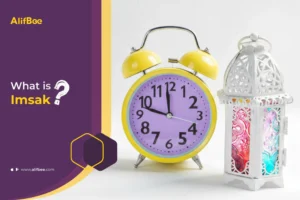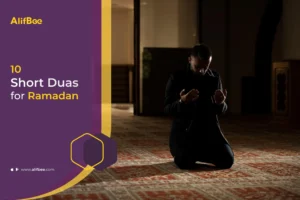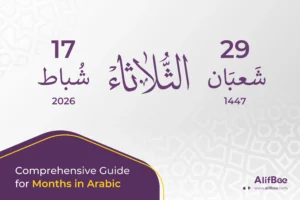Hello, Arabic learners! It’s a new post, a new lesson from AlifBee!
Many Arabic learners think mastering grammar is the gateway to learning Arabic, while that might be true for some, but vocabulary opens up doors for you. They are your weapon and window to master the Arabic language. When you learn new words every day, you’ll find yourself more proficient in the language. Today, we’ll explore some unique Arabic words you might not find in English. We will also show you a guide on how to write and pronounce them. Wait, don’t be stressed, these words are easy to learn, and you won’t be able to distinguish yourself from a native Arabic speaker when you get used to them.
Unique Arabic Words That Don't Translate to English
New Arabic learners face many hardships when it comes to learning new words, especially words that don’t have a direct English equivalent. At AlifBee, we make learning Arabic more fun by introducing new ways to obtain that native level you’ve always dreamed of.
What makes these words special to Arabic is that they are often used in emotional, cultural, or situational contexts. If you’ve made it this far in learning Arabic, you probably already know it’s a rich, expressive, and beautiful language. Modern Standard Arabic includes hundreds of thousands of words. Many of them have clear English equivalents and are relatively easy to learn. But what happens when you come across a word that doesn’t have a clear meaning in English? We know how tough it can be when you look up a word online, and the translation feels confusing or completely off.
Some Arabic words have different meanings depending on the context, culture, or place. People use these words a lot across the Arab world, but when you take them out of their original situation or translate them directly, they can lose their full meaning or feeling.
In this article, we’ll explore some of these untranslatable Arabic words and unpack what makes them so unique. So grab your notebook and pen and let’s get started!
What Makes Some Arabic Words Untranslatable?
There are some Arabic words that are considered untranslatable because they carry deep cultural, religious, or emotional meaning that is rooted in the Arabic-speaking world. These words often lack a direct counterpart in English, making literal translation insufficient. Usually, conveying their meaning requires a detailed explanation or even multiple words or phrases in English.
For newbie learners, this absence of one-to-one equivalents can be challenging and lead to confusion about how to properly understand or use such words, especially when context plays a key role in shaping their meaning.
List of 10 Common Arabic Words With No English Equivalent
If you are interested in exploring unique Arabic words that will make you sound like a fluent speaker, we’ve listed below our top 10 common Arabic words that you should know!
(Ghurba) غُرْبَة
الغُربَةُ مَدرَسَةٌ قاسِيَةٌ، لَكِنَّها تُعَلِّمُنا الكَثيرَ.
Ghurba is a harsh school, but it teaches us a lot.
Alghurbatu madrasatun qāsiyatun, lakinnahā tuʻalimunā alkathyr.
Literal meaning: Estrangement, exile. Cultural meaning: The emotional condition of being away from home.
Ghurba (غُرْبة) is often used to describe a nostalgic feeling for your home, loved ones, or your homeland. It’s the feeling of being far away from the things you love or from where you belong. Many English words could be used to describe ghurba, such as being in “exile” or “homesickness,” but none of them captures the essence and depth of ghurba.
(Tarab) طَرَب
هَذِهِ الموسِيقَى تُسَبِّبُ ليَ طَرَباً لا يوصَفُ.
This music causes me an indescribable state of ṭarab.
Hadhihi almwsīqá tusabbibu lya ṭaraban lā ywṣaf.
Meaning: A state of musical ecstasy or enchantment, often induced by traditional Arabic music.
Tarab (طَرَب) is a unique but common Arabic word used to describe something related to music. It’s when you reach a high level of enjoyment and excitement listening to music. “Euphoria” or “rapture” could deliver a similar meaning to tarab, but they are not that close to what tarab means.
('Ayb) عَيْبْ
لَقَدْ عَانَتْ مِنْ عَيْبِ النَّشْأَةِ فِي مُجْتَمَعٍ فَقِيرٍ
She suffered from the ‘Ayb of growing up in a poor community.
Laqad ʻānat min ʻaybi aalnnashʼati fī mujtamaʻin faqīrin
Meaning: Shame, taboo, social disgrace. Something inappropriate that violates social norms.
‘Ayb عَيب expresses both a moral judgment and societal disapproval, often used to scold.
The closest English term is “shame”, but English lacks a single word that blends moral and cultural impropriety in the same way. Next time you see your friend behaving in a bad manner, you might want to tell them: It’s ‘Ayb to act this way.
(Sabr) صَبْر
الصَّبْرُ مِفْتَاحُ الفَرَجِ، فَلَا تَيْأَسْ.
Ṣabr is the key to relief, so don’t despair.
Aalṣṣabru miftāḥu aalfaraji, falā tayʼas.
Meaning: Enduring hardship with patience, perseverance, and inner strength, often with spiritual significance.
Sabr صَبر is one of the most beautiful Arabic words. It’s not only patience or waiting; it’s hopeful waiting, one that has faith and humility. With sabr, there’s no despair or sadness because you’re waiting for something, and deep inside you know you’ll get what you want.
(Inshallah) إنْ شاءَ اللهُ
سَأَذْهَبُ إِلَى العَمَلِ غَدًا إِنْ شَاءَ اللهُ.
I will go to work tomorrow, Inshallah.
Saʼadhhabu ilá aalʻamali ghadan in shāʼa aalllahu.
Meaning: Literal meaning: “If God wills.”
Used for: Expressing hope, intention, or uncertainty about future events.
Inshallah إن شاء الله is a phrase used in everyday life and almost dominates every conversation. The closest English equivalent to this Arabic term is: “hopefully, God willing.” However, this translation doesn’t fully capture the meaning of Inshallah, which expresses that future events depend on God’s will. It adds a sense of optimism, hope, and trust in destiny.
(Fawda) فَوْضى
كَانَتِ العَلَاقَاتُ بَيْنَهُمَا فِي فَوْضًى تَامَّةً قَبْلَ الِانْفِصَالِ.
The relationships between them were in complete fawda before the separation.
Kānati aalʻalāqātu baynahumā fī fawḍan tāmmatan qabla aaliānfiṣāli.
eaning: Chaos, but with connotations of social disorder, lawlessness, and collapse.
Fawda فَوضى is one of the most unique Arabic words, and it’s more than just a “mess.” Fawda often refers to a broader meaning and includes the concepts of disorder, noise, and lack of control. While English may translate it as chaos, disorder, or confusion, none of these words convey the real depth of fawda, especially when used to describe societal breakdowns, family turmoil, or political upheaval.
(Nakhwa) نَخْوَة
كَانَتْ نَخْوَتُهُ تَدْفَعُهُ دَائِمًا لِتَقْدِيمِ المُسَاعَدَةِ لِمَنْ يَحْتَاجُهَا.
His nakhwa always drove him to help those in need.
Kānat nakhwatuhu tadfaʻuhu dāʼiman litaqdīmi aalmusāʻadati liman yaḥtājuhā.
Meaning: Noble protectiveness, especially toward women or the vulnerable, a traditional sense of honor and moral duty to protect.
If you watch Arabic movies or TV series, you’re likely to come across this word very often. Nakhwa is closely linked to authentic Arab values that reflect self-respect and noble morals, and is considered by many to be a measure of masculinity. The closest English concept to nakhwa is “chivalry,” but nakhwa is more grounded in family and tribal values than medieval romance.
(Hasad) حَسَد
حَسَدَ جارَهُ، وتَمَنّى أَن يَفقِدَ عَمَلَهُ.
He felt hasad towards his neighbor and wished he would lose his job.
Ḥasada jārahu, wa tamannā an yafqida ʿamalah.
Meaning: Malicious envy; wishing harm upon someone because of what they have.
Hasad حَسَد is an Arabic word that describes what someone wishes for someone else in a negative way. While the English word “envy” is often used as a translation, hasad goes deeper. It doesn’t just mean wanting what someone else has; it implies wishing the other person no longer has it.
(Tawakkul) تَوَكُّل
كَانَ تَوَكُّلُهُ عَلَى اللهِ كَامِلاً، فَاطْمَأَنَّ قَلْبُهُ تَمَامًا.
His tawakkul in God was complete, so his heart was fully at peace.
Kāna tawakkuluhu ʻalá aallhi kāmilan, fāṭmaʼanna qalbuhu tamāman.
Meaning: Complete reliance on God while taking responsible action; surrender without passivity.
Tawakkul تَوَكُّل is a unique Arabic word that is used daily. It’s a deep spiritual quality that involves trust and certainty in God’s providence and care. The closest English meaning is: “trust in God,” but tawakkul blends faith, action, and spiritual surrender.
(Baraka) بَرَكة
هَذِهِ الشَّجَرَةُ فِيهَا بَرَكَةٌ وَخَيْرٌ كَثِيرٌ.
This tree has baraka and abundant goodness.
Hadhihi aalshshajaratu fīhā barkatun wakhayrun kathīr.
Meaning: A blessing or divine grace that brings spiritual or material goodness.
Baraka is a beautiful word that implies positivity, continuity, and spiritual potency. The closest English equivalent to baraka is “blessing,” but it lacks the spiritual vibes that baraka بركة has. For instance, when your mom prays to you, that adds baraka to your day!
Why These Words Matter for Arabic Learners
These unique Arabic phrases mentioned above are an important part of everyday Arabic. They are used in both spoken and written communication. That’s why it’s important to understand their actual meanings and how they are used. This may take time and effort, but using the right learning approach will make the process very enjoyable, especially when you compare them with similar words in English.
When you start using these words, you will make your speech sound more natural and fluent, like that of a native Arab speaker. That is why it’s a good idea to learn some of the most unique words that may not have a direct or one-to-one translation.
Once you have mastered these words, you can move on to the rest. None of the words mentioned above are rare or outdated, so you can use any of them confidently when speaking with native Arabic speakers from different regions.
How to Learn and Use Arabic Words That Don't Translate
What most students find fascinating about Arabic is that there are a bunch of ways to learn new words every day. You can begin by learning the most common words, as you are likely to hear them often in Arabic conversations, TV shows, or when traveling to Arabic-speaking countries.
Here are some tips to help you memorize new vocabulary easily:
- Write the vocabulary words in a notebook in an orderly manner.
- Review the words again after 24 hours, then after a week, and then after a month.
- Read the words repeatedly, as this will help you remember them more easily.
- Use the new words; students need to use a new word about ten times to memorize it.
- Play word games, such as crossword puzzles, word jumbles, and word searches.
- Create flashcards with the new words written on them, and take them with you to read on the bus or while waiting for a friend.
- It’s preferable to learn words with a friend, as this makes learning more enjoyable and easier.
- Learn how to use a dictionary, find out what information is next to the word in the dictionary, and learn about the different types of dictionaries.
- Learn new words every day; eight words is a good number per day.
However, our most preferred way to learn and memorize new words is to apply them in context. For instance, take the word tarab, which we’ve explained earlier. It’s used in musical content and often conveys emotions. If you are a big fan of Arab singers, you could use this word to describe your love for your favorite singer by saying: Listening to his songs is like tarab to me!
For a more comprehensive Arabic list, please check our previous article on the 100 most common Arabic words.
Learn a New Word Every Day With AlifBee!
And finally, remember that mastering these unique Arabic words will enhance your vocabulary and deepen your appreciation of Arabic culture.
AlifBee will support your journey in learning Arabic, but all you need to do is keep practicing, stay curious, and enjoy every step of your language learning journey. With patience and dedication, you’ll soon speak Arabic more naturally and confidently! Remember, all you need is Sabr!
For a wonderful Arabic language learning experience, download our AlifBee app for learning Arabic like never before.








